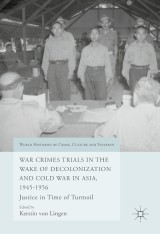Details

War Crimes Trials in the Wake of Decolonization and Cold War in Asia, 1945-1956
Justice in Time of TurmoilWorld Histories of Crime, Culture and Violence
|
26,74 € |
|
| Verlag: | Palgrave Macmillan |
| Format: | |
| Veröffentl.: | 04.11.2016 |
| ISBN/EAN: | 9783319429878 |
| Sprache: | englisch |
Dieses eBook enthält ein Wasserzeichen.
Beschreibungen
<div>This book investigates the political context and intentions behind the trialling of Japanese war criminals in the wake of World War Two. After the Second World War in Asia, the victorious Allies placed around 5,700 Japanese on trial for war crimes. Ostensibly crafted to bring perpetrators to justice, the trials intersected in complex ways with the great issues of the day. They were meant to finish off the business of World War Two and to consolidate United States hegemony over Japan in the Pacific, but they lost impetus as Japan morphed into an ally of the West in the Cold War. Embattled colonial powers used the trials to bolster their authority against nationalist revolutionaries, but they found the principles of international humanitarian law were sharply at odds with the inequalities embodied in colonialism. Within nationalist movements, local enmities often overshadowed the reckoning with Japan. And hovering over the trials was the critical question: just what was justice forthe Japanese in a world where all sides had committed atrocities?</div>
<div><br></div><div>JUSTICE IN TIME OF TURMOIL. WAR CRIMES TRIALS IN ASIA IN THE CONTEXT OF DECOLONIZATION AND COLD WAR KERSTIN VON LINGEN/ ROBERT CRIBB.- COLONIALISM, ANTI-COLONIALISM AND NEO-COLONIALISM IN CHINA: THE OPIUM QUESTION AT THE TOKYO WAR CRIMES TRIBUNAL NEIL BOISTER.- THE FRENCH PROSECUTION AT THE IMTFE: ROBERT ONETO, INDOCHINA AND THE REHABILITATION OF FRENCH PRESTIGE BEATRICE TREFALT.- DECOLONIZATION AND SUBALTERN SOVEREIGNTY: INDIA AND THE TOKYO TRIAL MILINDA BANERJEE.- THE LEGACY OF EXTRATERRITORIALITY AND THE TRIAL OF JAPANESE WAR CRIMINALS IN THE REPUBLIC OF CHINA ANJA BIHLER.- THE BURMA TRIALS OF JAPANESE WAR CRIMINALS, 1946-1947 ROBERT CRIBB.- COLONIZATION AND POST-COLONIAL JUSTICE - U.S. AND PHILIPPINE WAR CRIMES TRIALS AFTER WWII IN MANILA WOLFGANG FORM.- JUSTICE AND DECOLONIZATION: WAR CRIMES ON TRIAL IN SAIGON, 1946-1950 ANN-SOPHIE SCHOEPFEL.- NETHERLANDS EAST INDIES’ WAR CRIME TRIALS IN THE FACE OF DECOLONIZATION LISETTE SCHOUTEN.- AUSTRALIA’S PURSUIT OF THE FORMOSAN AND KOREAN ‘JAPANESE’ WAR CRIMINALS DEAN ASZKIELOWICZ.- FROM TOKYO TO KHABAROVSK – SOVIET WAR CRIMES TRIALS IN ASIA AS COLD WAR BATTLEFIELDS VALENTYNA POLUNINA.- RESURRECTING DEFEAT: INTERNATIONAL PROPAGANDA AND THE SHENYANG TRIALS OF 1956 ADAM CATHCART</div><div><br></div>
<p><b>Kerstin von Lingen </b>is Researcher and Lecturer at Heidelberg University, Germany in the ‘Asia and Europe in a Global Context’ Cluster of Excellence. Since 2013, she has led an independent research group, ‘Transcultural Justice: Legal Flows and the Emergence of International Justice within the East Asian War Crimes Trials, 1945-1954’. She is the 2016 laureate of the International Chair for the History of the Second World War, awarded by the Université Libre de Bruxelles.</p>
<div>This book investigates the political context and intentions behind the trialling of Japanese war criminals in the wake of World War Two. After the Second World War in Asia, the victorious Allies placed around 5,700 Japanese on trial for war crimes. Ostensibly crafted to bring perpetrators to justice, the trials intersected in complex ways with the great issues of the day. They were meant to finish off the business of World War Two and to consolidate United States hegemony over Japan in the Pacific, but they lost impetus as Japan morphed into an ally of the West in the Cold War. Embattled colonial powers used the trials to bolster their authority against nationalist revolutionaries, but they found the principles of international humanitarian law were sharply at odds with the inequalities embodied in colonialism. Within nationalist movements, local enmities often overshadowed the reckoning with Japan. And hovering over the trials was the critical question: just what was justice forthe Japanese in a world where all sides had committed atrocities?</div>
Explores the contradictory intentions embodied in bringing perpetrators to justice Offers a fresh perspective on justice in Asia Draws attention to the Asian dimension in the history in international humanitarian law
<p>“Fills a major gap in our knowledge about the complex post-War accountability processes in Asia and the Pacific after the end of the Second World War ... . Just as the Tokyo trial remains in the shadow of Nuremberg, the second tier trials in the Far East have never had the recognition they deserve. ... However, the vision underpinning this goes beyond neglected histories. The central issue probed by the contributors is the relationship between these trials and emergent nationalism leading to the crumbling of colonial empires. … providing us an important, fascinating and still-relevant window into the handling of the past in Asia and the Pacific.” (Suzannah Linton, Zhejiang Gongshang University, China)</p>
Diese Produkte könnten Sie auch interessieren:

The Last Samurai - Japanische Geschichtsdarstellung im populären Kinofilm

von: Daniel Scherrer

34,99 €















